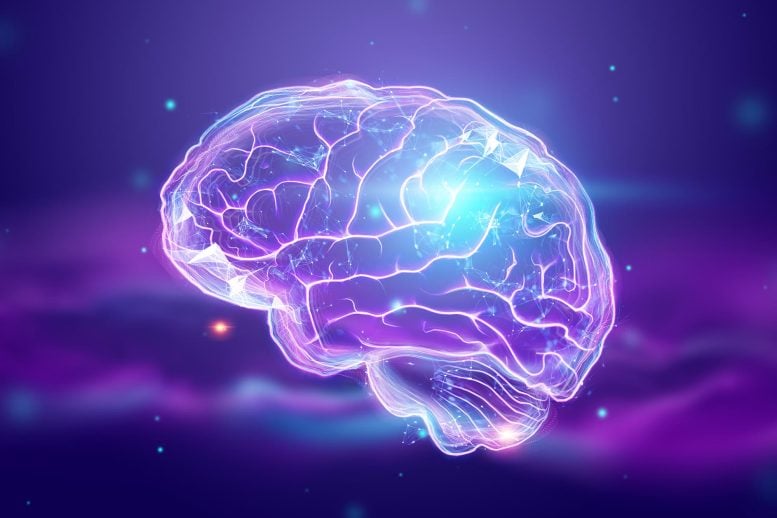
A new study highlights the critical role of specific nutrients found in the Mediterranean diet in promoting brain health and slowing cognitive decline, providing a basis for future nutritional interventions.
Participants whose brains aged more slowly had a nutritional profile similar to that of the Mediterranean diet.
Scientists have conducted extensive research on the brain to promote healthier aging. Although there is considerable knowledge about the risk factors that accelerate brain aging, less is understood about how to prevent cognitive decline.
There is evidence that nutrition is important, and a new study published May 21 in the journal Natural agingfrom the Center for Brain, Biology and Behavior at the University of Nebraska-Lincoln and the University of Illinois at Urbana-Champaign, further indicates how specific nutrients may play a central role in healthy aging of the brain.
The team of scientists, led by Aron Barbey, director of the Center for Brain, Biology and Behavior, with Jisheng Wu, a doctoral student at Nebraska, and Christopher Zwilling, a researcher at UIUC, carried out the multimodal study – combining the state-of-the-art innovations in neuroscience and nutritional science – and identified a specific nutritional profile in participants who had better cognitive outcomes.
Study design and results
The cross-sectional study recruited 100 cognitively healthy participants, aged 65 to 75 years. These participants completed a questionnaire containing demographic information, body measurements, and physical activity. Blood
” data-gt-translate-attributes=”({“attribute”:”data-cmtooltip”, “format”:”html”})” tabindex=”0″ role=”link”>plasma was collected after a fasting period to analyze nutrient biomarkers. Participants also underwent cognitive assessments and MRI scans. The efforts revealed two types of brain aging in participants: accelerated and slower than expected. Those with slower brain aging had a distinct nutritional profile.

Principal investigator Aron Barbey, professor of psychology and director of the Center for Brain, Biology and Behavior at the University of Nebraska-Lincoln, with doctoral student Jisheng Wu. Credit: Craig Chandler/University Communications and Marketing/University of Nebraska -Lincoln
Beneficial nutrient blood biomarkers were a combination of fatty acids (vaccenic, gondoic, alpha-linolenic, eicosapentaenoic, eicosadienoic, and lignoceric acids); antioxidants and carotenoids, including cis-lutein, trans-lutein and zeaxanthin; two forms of vitamin E and choline. This profile correlates with nutrients found in the Mediterranean diet, which research has previously linked to healthy brain aging.
“We studied specific nutritional biomarkers, such as fat
” data-gt-translate-attributes=”({“attribute”:”data-cmtooltip”, “format”:”html”})” tabindex=”0″ role=”link”>acid profiles, known in nutritional science to potentially offer health benefits. This fits with the large body of research in the field demonstrating the positive health effects of the Mediterranean diet, which emphasizes foods rich in these beneficial nutrients,” said Barbey, the Mildred Francis Thompson Professor of Psychology. “The present study identifies particular patterns of nutritional biomarkers that show promise and have favorable associations with measures of cognitive performance and brain health. »

Christopher Zwilling is a research scientist at the University of Illinois at Urbana-Champaign. Credit: University of Nebraska-Lincoln
Barbey noted that previous research on nutrition and brain aging has relied primarily on food frequency questionnaires, which depend on participants’ own memories. This study is one of the first and largest to combine brain imaging, blood biomarkers and validated cognitive assessments.
“The unique aspect of our study is its comprehensive approach, integrating data on nutrition, cognitive function and brain imaging,” Barbey said. “This allows us to build a more robust understanding of the relationship between these factors. We go beyond simply measuring cognitive performance with traditional neuropsychological tests. Instead, we simultaneously examine brain structure, function, and metabolism, demonstrating a direct link between these brain properties and cognitive abilities. Furthermore, we show that these brain properties are directly linked to diet and nutrition, as revealed by patterns observed in nutritional biomarkers.
Future Research and Implications
Researchers will continue to explore this nutritional profile in the context of healthy brain aging. Barbey said it is possible, in the future, that the findings could contribute to the development of therapies and interventions aimed at promoting brain health.
“An important next step is to conduct randomized controlled trials. In these trials, we will isolate specific nutrients with favorable associations with cognitive function and brain health, and administer them as nutraceuticals,” Barbey said. “This will allow us to definitively assess whether increasing levels of these specific nutrient profiles reliably leads to improvements in performance on cognitive tests and measures of brain structure, function and metabolism.”
Barbey is also co-editing an upcoming special collection for the Journal of Nutrition, “Nutrition and the Brain – Exploring Pathways to Optimal Brain Health Through Nutrition,” which is currently soliciting submissions for review, and articles will begin publishing next year .
“There is immense scientific and medical interest in understanding the profound impact of nutrition on brain health,” Barbey said. “Aware of this, the
” data-gt-translate-attributes=”({“attribute”:”data-cmtooltip”, “format”:”html”})” tabindex=”0″ role=”link”>National Institutes of Health recently launched a ten-year strategic plan aimed at significantly accelerating nutrition research. Our work directly aligns with this critical initiative, aiming to provide valuable insights into how dietary habits influence brain health and cognitive function.
Reference: “Investigating Nutrient Biomarkers of Healthy Brain Aging: A Multimodal Brain Imaging Study” by Christopher E. Zwilling, Jisheng Wu, and Aron K. Barbey, May 21, 2024, npj aging.
DOI: 10.1038/s41514-024-00150-8
The study was funded by Abbott Nutrition.